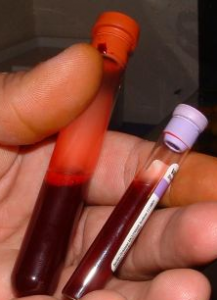new to the gluten free journey?
new to the gluten free journey?
 A new study on children with celiac disease finds that using anti-gliadin antibodies (AGA) to monitor dietary compliance is inaccurate. The authors report an increase in the amount of children who have negative test results to gliadin (the gluten component of wheat).
A new study on children with celiac disease finds that using anti-gliadin antibodies (AGA) to monitor dietary compliance is inaccurate. The authors report an increase in the amount of children who have negative test results to gliadin (the gluten component of wheat).
CONCLUSION: Serum AGA seem no longer useful for monitoring compliance to gluten-free diet. In children where AGA are negative at diagnosis, when the child eats a normal amount of gluten, they are going to remain negative even after poor compliance.
Stay up-to-date with the latest articles, tips, recipes and more.

*These statements have not been evaluated by the Food and Drug Administration. This product is not intended to diagnose, treat, cure or prevent any disease.
If you are pregnant, nursing, taking medication, or have a medical condition, consult your physician before using this product.
The entire contents of this website are based upon the opinions of Peter Osborne, unless otherwise noted. Individual articles are based upon the opinions of the respective author, who retains copyright as marked. The information on this website is not intended to replace a one-on-one relationship with a qualified health care professional and is not intended as medical advice. It is intended as a sharing of knowledge and information from the research and experience of Peter Osborne and his community. Peter Osborne encourages you to make your own health care decisions based upon your research and in partnership with a qualified health care professional.
8 Responses
My daughter was diagnosed by genetic testing, but 1 month later is still experiencing a lot of abdominal pain.
Audrey,
Is your daughter TRUE gluten free or does she eat a lot of “gluten free” products?
My 6 year old developed diarreha for 2 weeks and then started vomitting. She became lethargic and had the “malnourished” joints. Because I was diagnosed with Celiacs, my family doctor had no problem running the blood tests. They all came back VERY positive. The Pediatric Gastroenterologist said that a scope/biopsy of the small intestine wasn’t necessary due to her high levels of antibodies. She was diagnosed in Aug 2009 and her 6 month tests were down by 3/4. still a ways to go to be “normal”.
My daughter was diagnosed by genetic testing, but 1 month later is still experiencing a lot of abdominal pain.
Bruce,
Is your daughter True gluten free? For details watch this video:
https://stg-gfsociety-testing.kinsta.cloud/video-tutorial/gluten-sensitivity-what-is-it/
All the best,
Dr. O
For years, my doctor diagnosed me with IBS. She said as a student, it is normal for me to have digestive problems due to stress. I had random diarrhea/constipation, constant bloating, anemia and other malabsorption symptoms. I caught a GI bug in Mexico last year, and was extremely sick. Afterwards, I could not tolerate any gluten. I kept a food diary, which clearly showed that gluten = diarrhea. I was vomiting/diarrhea up to 10 times a day, and rapidly losing what little weight I had. My doctor did a Celiac blood test, which came back “inconclusive”. She sent me to a GI specialist who told me Celiac was rare, and that I had IBS. My doctor also sent me for a barium enema, a small intestine ultrasound, and skin prick allergy testing all of which came back clear. After 6 months of fighting with my doctor and 15 lbs, I was emaciated and miserable. I gave up on my doctor, and went gluten free. Within weeks I was feeling better. Now, 8 months gluten free, my skin tone has changed (I had to buy a darker shade of makeup), my hair has never been thicker, my skin is soft and clear, my head is clear, I sleep better, and have more energy and am happier than I could ever imagine. My bad days now are still better than what I used to consider a good day. Now if I accidentally eat gluten, my stomach swells up and I look pregnant, and have diarrhea for a few days. I do not have an official Celiac diagnosis, but there is no way I would eat gluten again to get a blood test/biopsy.
Awesome success story Shawna! Thank you so much for sharing it with us.
All the best,
Dr. Osborne